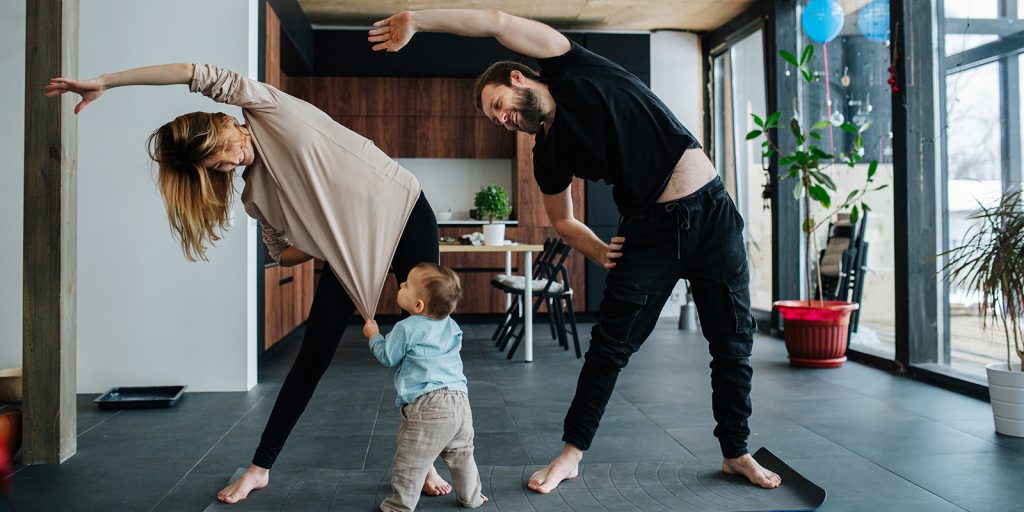Discuss the venture with your family
Try to explain to your family that studying together is a good idea. They not only improve health, but also bring people together and give everyone pleasant emotions. And it’s easier to stick to a schedule when you’re not training alone.
Be an example for your family
If your loved ones ignore your suggestions or avoid any physical activity, try starting alone. A positive example can also be contagious.
It will be even more effective if you ask your family to become a support group: you run, and they play or take a leisurely walk. With team sports it’s even simpler: someone will definitely want to throw the ball with you. And there it’s already not far from active training.
Choose the right sport
When everyone is ready to practice, make a complete list of sports that each family member enjoys. Probably, some options will be the same – that’s where you should start. If there are no intersections or, on the contrary, there are too many of them, you can sort the disciplines using voting. If you don’t have enough ideas, you don’t need to worry: while you try the ones you have, new ones may appear.
When you decide on the list and agree on where to start, it’s worth attending a test lesson. If everyone likes it, great, you can move on to regular training. If not, try the next step. And if you have mixed impressions, it won’t hurt to explore similar options. For example, if tennis seems difficult but interesting, you can go to badminton.
So, by trial and error you will find a suitable sport.
Create a class schedule
To start, try to create a schedule for the week or month. Factor in work, school, household chores and be sure to leave time for relaxation. It is important to identify at least one or two windows a week and start exercising: a habit will gradually form.
I recommend working out in the morning to perk you up and set the right mood for the day. This is good if you don’t have to travel anywhere and take a long time to get ready. For example, to go jogging together, it’s enough to get up early and go outside together. At home, you can collectively do gymnastics or yoga.
Another option is to train on weekends. Even if there are a lot of household chores, everyone will definitely be able to find an hour for sports. Well, or a couple of hours, if you want to expand the choice of activities and go to the gym, play football or swim in the pool together.
Combine sports
When you manage to fit your first classes into your schedule and attend them regularly, you can think about a new discipline. If you combine exercises, they will not turn into a routine, and the development of muscles and skills will be more harmonious. For example, swimming is good for the muscular system, and basketball teaches teamwork.
Remember that it is important not to overuse. If you feel that there is too much to do, it is better to remove some activities.
Keep a journal of achievements
This is a good way to stay motivated. On the one hand, all successes are noted and progress becomes visible, but on the other hand, you want to achieve more in order to make a new entry in the journal.
Note the starting point—the initial results for each family member. And then update the data monthly.
Try to write down even small achievements, they should become a reason for pride and praise. And at the end of the month, you can compare old and new indicators, rejoice at your successes, and even organize small celebrations with the presentation of small gifts. This way, working on your results will turn into a pleasant game.
Support each other
This applies to all areas of life, sports will be no exception. Support can be both physical and moral. For example, if a child can’t do pull-ups, you can start doing exercises together to strengthen the arms and back, or add elastic bands that will reduce the weight and make the task easier. You can also talk about your own failures and show that everyone has difficulties, but it’s possible to overcome them.
Monitor the load
Be sure to pay attention to the condition of your loved ones, especially children. If after classes they are lethargic, cannot catch their breath for a long time, and are not in the mood, then most likely the load is too high and is not beneficial. In this case, it is worth reducing the number of approaches, training time, or taking longer breaks.
If you are too tired, there will be no benefit from training, and even enthusiasts will soon lose the desire to train.
Skip class sometimes
Nothing bad will happen if you do this once every 1-2 months. These breaks are necessary to stay motivated and not get tired. When one or more family members are too lazy to go to exercise, allow them and yourself to relax and skip the session. Spend your free time in a different way: go to a movie or cafe, take a walk in the park, or have a board game evening.
The main thing is that absenteeism does not become a habit. Rest is good, but discipline is also important.
Motivation needs to be increased 🏃♀️⚽️🎾
